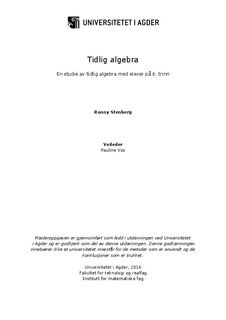Tidlig algebra : en studie av tidlig algebra med elever på 6. trinn
Abstract
The main theme for the research described in this thesis is early algebra. Early algebra is a
phase that could fit the gap between arithmetic and algebra. Early algebra includes algebraic
reasoning, such as analyzing relationships between quantities, noticing structure, studying
change, or generalizing, without a need to use symbols. In my Theoretical Frame, I define the
terms early algebra, algebraic thinking, and generalization; I explain the differences between
early algebra and pre-algebra, and I go into the relationships between arithmetic and algebra.
To gain insight into early algebra, I have studied how pupils in 6th grade (approx. 12 years
old) reason and how they generalize when they play a number game on the computer, called
Beads on a String. This game is about a row of colorful beads (the row contains 4 – 10
beads), and the pupils must predict the position of the beads when this row is repeated many
times. When analyzed algebraically, there are four variables in this game. The game consists
of ten tasks.
My research question was:
- How do pupils in the 6th grade reason when they play Beads in a Chain, and
how do they generalize?
In this study I used a qualitative research approach in the form of classroom observation,
where pupils worked together in groups of two or three with the game on a computer. There
were seven groups. The pupils were from a school in a small town near Kristiansand.
I used a screen capturing-program that produces a video of what the pupils did on the screen
together with what they communicated about while they worked. I was present in the
classroom for two lessons hours and afterwards I conducted an interview with each of the
groups.
I performed a data reduction by first going through all video materials and making an
overview of the strategies the pupils used. Thereafter, I selected episodes for transcription and
detailed analysis. I selected the episodes aiming at analyzing the variation in the solution
strategies the pupils used.
The results showed a great variation in how the pupils reasoned when they solved the tasks
and that there was great diversity in the solution strategies they used. Some strategies were
more naïve, while other strategies showed clearly algebraic thinking. I observed
generalizations across all four variables that I had identified in the game. The game was
accessible to all pupils, whether perceived as lower or higher achievers by their teacher, and it
was remarkable that some of the lower achieving pupils solved the tasks efficiently through
creative strategies that showed their generalizing abilities.
My study points out that it is necessary to have a broad understanding of what algebraic
thinking is. With an increasing use of PCs and games in the teaching of mathematics, we can
find new ways to enable pupils to reason algebraically. My study revealed that algebraic
reasoning can motivate them and not least what kind of generalizations they can make.
Description
Masteroppgave matematikkdidaktikk – Universitetet i Agder 2016
